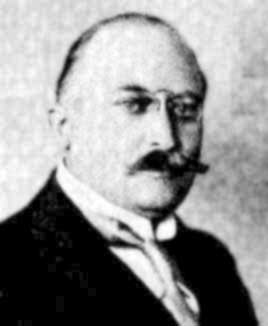
Johan Ludwig William Valdemar Jensen
 المؤلف:
B Jessen
المؤلف:
B Jessen
 المصدر:
Biography in Dictionary of Scientific Biography
المصدر:
Biography in Dictionary of Scientific Biography
 الجزء والصفحة:
...
الجزء والصفحة:
...
 26-2-2017
26-2-2017
 742
742
Born: 8 May 1859 in Nakskov, Denmark
Died: 5 March 1925 in Copenhagen, Denmark

Johan Ludwig Jensen's father was the sort of person who undertook a whole series of different projects yet, despite his good education and cultured style, the projects tended to end up financial failures. When Jensen was young his father took a position in Sweden as the manager of an estate in the north of the country. Jensen always said in later life that these childhood years were "the most wonderful of his life".
When his position as estate manager ended Jensen's father returned to Denmark and Jensen completed his schooling in Copenhagen. In 1876 he entered the College of Technology and there he studied a range of science subjects including physics, chemistry and mathematics. It was, however, mathematics which began to dominate his life as he lost interest in other topics so that he could devote all his attention to the mathematics he loved most of all. Dropping all other subjects except mathematics, he began to undertake research on his own, publishing his first papers while a student at the College of Technology.
Jensen was essentially self taught in research level mathematics and never held an academic appointment. At just the time when mathematics was the only subject that interested him and one would have expected someone of his abilities and keenness to go on to research degrees, he accepted an appointment working for a telephone company. This was not out of desire to give up mathematical research, rather it was to enable him to earn money to support himself so that he could continue to enjoy himself as a mathematician. His position was with the Copenhagen Division of the International Bell Telephone Company and, not unexpectedly for someone of his outstanding abilities, he soon impressed both for these abilities and for the hard work he was prepared to put in for the company.
In the following year, 1882, the Copenhagen Division of the International Bell Telephone Company became the Copenhagen Telephone Company. The Company thrived, at least in part through the high level of technical skill that Jensen possessed. He continued to work for the company until 1924 becoming head of the technical department in 1890. For his whole working life Jensen was an amateur mathematician only doing mathematics in his spare time. However, he reached a very high level of expertise as a mathematician as he did as a telephone engineer.
Jensen contributed to the Riemann Hypothesis, proving a theorem which he sent to Mittag-Leffler who published it in 1899. The theorem is important, but does not lead to a solution of the Riemann Hypothesis as Jensen had hoped. It expresses [1]:-
... the mean value of the logarithm of the absolute value of a holomorphic function on a circle by means of the distances of the zeros from the centre and the value at the centre.
He also studied infinite series, the gamma function and inequalities for convex functions. In a paper which he published in Acta mathematica in 1906, Jensen proved an inequality for convex functions which had a whole host of classical inequalities as special cases.
Jessen writes in [1]:-
Weierstrass was his ideal, and his papers are patterns of exact and precise exposition.
- B Jessen, Biography in Dictionary of Scientific Biography (New York 1970-1990).
http://www.encyclopedia.com/doc/1G2-2830902186.html
Articles:
- A I Borodin and V F Gallo, Mathematical calendar for the 1988/89 academic year (May-June) (Russian), Mat. v Shkole (2) (1989), 141-143.
- G Polya, Über die algebraisch- funktionentheoretischen Untersuchungen von J L W V Jensen, Mathematisk-fysiske Meddelelsev VII 17 (1927), 1-33.
 الاكثر قراءة في 1850to1859
الاكثر قراءة في 1850to1859
 اخر الاخبار
اخر الاخبار
اخبار العتبة العباسية المقدسة


